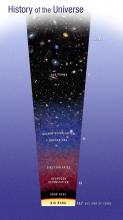Listen to today's episode of StarDate on the web the same day it airs in high-quality streaming audio without any extra ads or announcements. Choose a $8 one-month pass, or listen every day for a year for just $30.
You are here
Hubble Constant
Astronomy is a science of numbers. And none is more important than the Hubble constant — a measurement of how fast the universe is expanding. Astronomers have been refining that number for decades. But they don’t yet agree on just what it should be.
The number is named for Edwin Hubble, who discovered that the universe is expanding. He also found that there’s a relationship between the distance to a remote galaxy and how fast the galaxy is moving away from us as a result of that expansion. He used that relationship to calculate the rate of expansion.
After Hubble, other astronomers used several types of stars to get better measurements of the distances to other galaxies — and how fast the galaxies were moving away from us.
In the language of astronomy, that yielded a value for the Hubble constant of about 74 kilometers per second per megaparsec. In other words, for every million light-years you travel away from Earth, the rate of expansion increases by about 50,000 miles per hour.
But a technique that measures the “afterglow” of the Big Bang came up with a smaller number. And a third method, which measures dying stars, recently came up with a number that’s between the other two. So there’s still no agreement on the Hubble constant — one of the most important numbers in astronomy.
It’s especially important because the expansion rate helps astronomers determine the age of the universe. More about that tomorrow.



